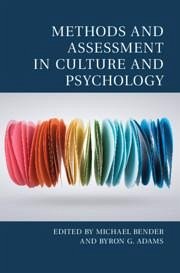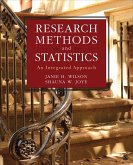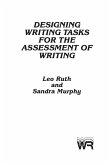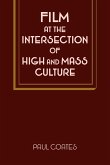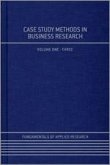Methods and Assessment in Culture and Psychology
Herausgeber: Bender, Michael; Adams, Byron G
Methods and Assessment in Culture and Psychology
Herausgeber: Bender, Michael; Adams, Byron G
- Broschiertes Buch
Andere Kunden interessierten sich auch für
![Research Methods and Statistics Research Methods and Statistics]() Janie H WilsonResearch Methods and Statistics217,99 €
Janie H WilsonResearch Methods and Statistics217,99 €![Designing Writing Tasks for the Assessment of Writing Designing Writing Tasks for the Assessment of Writing]() Leo RuthDesigning Writing Tasks for the Assessment of Writing61,99 €
Leo RuthDesigning Writing Tasks for the Assessment of Writing61,99 €![Research Methods in Applied Behavior Analysis Research Methods in Applied Behavior Analysis]() Jon S BaileyResearch Methods in Applied Behavior Analysis233,99 €
Jon S BaileyResearch Methods in Applied Behavior Analysis233,99 €![Film at the Intersection of High and Mass Culture Film at the Intersection of High and Mass Culture]() Paul CoatesFilm at the Intersection of High and Mass Culture38,99 €
Paul CoatesFilm at the Intersection of High and Mass Culture38,99 €![The Study of Living Control Systems The Study of Living Control Systems]() Richard S MarkenThe Study of Living Control Systems44,99 €
Richard S MarkenThe Study of Living Control Systems44,99 €![Case Study Methods in Business Research Case Study Methods in Business Research]() Case Study Methods in Business Research1.363,99 €
Case Study Methods in Business Research1.363,99 €![Criminal Justice Research Methods Criminal Justice Research Methods]() Gerald J BayensCriminal Justice Research Methods153,99 €
Gerald J BayensCriminal Justice Research Methods153,99 €-
-
-
Produktdetails
- Verlag: Cambridge University Press
- Seitenzahl: 400
- Erscheinungstermin: 18. Februar 2021
- Englisch
- Abmessung: 229mm x 152mm x 20mm
- Gewicht: 494g
- ISBN-13: 9781108701150
- ISBN-10: 1108701159
- Artikelnr.: 60158540
Hinweis: Dieser Artikel kann nur an eine deutsche Lieferadresse ausgeliefert werden.
- Herstellerkennzeichnung
- Libri GmbH
- Europaallee 1
- 36244 Bad Hersfeld
- gpsr@libri.de
Part I. Introduction to Methods and Assessment in Culture and Psychology
Michael Bender and Byron G. Adam; 1. Acculturation and Identity; Part II.
Three Generations of Psychological Acculturation Research: Theoretical
Advancements and Methodological Challenges David L. Sam and Colleen Ward;
Part III. A Road Map for Integrating Religiosity to Acculturation Research
Derya Güngör and Karen Phalet; Part IV. Identity in Remote Acculturation:
Developments in Research and Methodology Byron G. Adams, Cagla Giray, Gail
M. Ferguson; Part V. Acculturation and Diversity Management at Work: The
Case of Multicultural South Africa Leon T. B. Jackson, Byron G. Adams, and
Michael Bender; 2. Individual Differences across Cultures; Part VI.
Broadening the Bases of Methodological Rigor in Cross-Cultural Educational
Assessment Jia He, Isabel Benítez, and Kutlay Yagmur; Part VII.
Individuals, Groups, and Classrooms Conceptual and Methodological
Considerations on Studying Approaches to Cultural Diversity in Schools Maja
Katharina Schachner, Miriam Schwarzenthal, Peter Noack; Part VIII. Emotion
between Universalism and Relativism: Finding a Standard for Comparison in
Cross-Cultural Emotion Research Johnny R. J. Fontaine and Seger M.
Breugelmans; Part IX. Culture is More than Self-Reported Motives, Beliefs,
and Values-Methodological Advancements of Measuring Implicit Motives across
Cultural Contexts Athanasios Chasiotis, Jan Hofer, and Michael Bender; Part
X. Development of the South African Personality Inventory: A Cross-Cultural
Design in a Non-Western Society - Lessons Learned and Generalizability to
Other Parts of the World Deon Meiring, J. Alewyn Nel, Velichko H.
Fetvadjiev, and Carin Hill; Part XI. Combining Global and Local Approaches
in Psycholexical Studies: Glocal Illustrations from Studies on Arabic Pia
Zeinoun and Lina Daouk-Öyry; 3. Culture and Assessment; Part XII.
Psychological Assessment In and Over Time: Challenges of Assessing
Psychological Constructs and Processes in Cultural Dynamics Yoshihisa
Kashima; Part XIII. Priming Culture(s): How Theories and Methods Inspire
Each Other Chi-yue Chiu; Part XIV. The Evolution of Multigroup Comparison
Testing across Culture: Past, Present, and Future Perspectives Barbara M.
Byrne and David Matsumoto; Part XV. How Far Can Measurement Be
Culture-Free? Ronald Fischer and Peter B. Smith.
Michael Bender and Byron G. Adam; 1. Acculturation and Identity; Part II.
Three Generations of Psychological Acculturation Research: Theoretical
Advancements and Methodological Challenges David L. Sam and Colleen Ward;
Part III. A Road Map for Integrating Religiosity to Acculturation Research
Derya Güngör and Karen Phalet; Part IV. Identity in Remote Acculturation:
Developments in Research and Methodology Byron G. Adams, Cagla Giray, Gail
M. Ferguson; Part V. Acculturation and Diversity Management at Work: The
Case of Multicultural South Africa Leon T. B. Jackson, Byron G. Adams, and
Michael Bender; 2. Individual Differences across Cultures; Part VI.
Broadening the Bases of Methodological Rigor in Cross-Cultural Educational
Assessment Jia He, Isabel Benítez, and Kutlay Yagmur; Part VII.
Individuals, Groups, and Classrooms Conceptual and Methodological
Considerations on Studying Approaches to Cultural Diversity in Schools Maja
Katharina Schachner, Miriam Schwarzenthal, Peter Noack; Part VIII. Emotion
between Universalism and Relativism: Finding a Standard for Comparison in
Cross-Cultural Emotion Research Johnny R. J. Fontaine and Seger M.
Breugelmans; Part IX. Culture is More than Self-Reported Motives, Beliefs,
and Values-Methodological Advancements of Measuring Implicit Motives across
Cultural Contexts Athanasios Chasiotis, Jan Hofer, and Michael Bender; Part
X. Development of the South African Personality Inventory: A Cross-Cultural
Design in a Non-Western Society - Lessons Learned and Generalizability to
Other Parts of the World Deon Meiring, J. Alewyn Nel, Velichko H.
Fetvadjiev, and Carin Hill; Part XI. Combining Global and Local Approaches
in Psycholexical Studies: Glocal Illustrations from Studies on Arabic Pia
Zeinoun and Lina Daouk-Öyry; 3. Culture and Assessment; Part XII.
Psychological Assessment In and Over Time: Challenges of Assessing
Psychological Constructs and Processes in Cultural Dynamics Yoshihisa
Kashima; Part XIII. Priming Culture(s): How Theories and Methods Inspire
Each Other Chi-yue Chiu; Part XIV. The Evolution of Multigroup Comparison
Testing across Culture: Past, Present, and Future Perspectives Barbara M.
Byrne and David Matsumoto; Part XV. How Far Can Measurement Be
Culture-Free? Ronald Fischer and Peter B. Smith.
Part I. Introduction to Methods and Assessment in Culture and Psychology
Michael Bender and Byron G. Adam; 1. Acculturation and Identity; Part II.
Three Generations of Psychological Acculturation Research: Theoretical
Advancements and Methodological Challenges David L. Sam and Colleen Ward;
Part III. A Road Map for Integrating Religiosity to Acculturation Research
Derya Güngör and Karen Phalet; Part IV. Identity in Remote Acculturation:
Developments in Research and Methodology Byron G. Adams, Cagla Giray, Gail
M. Ferguson; Part V. Acculturation and Diversity Management at Work: The
Case of Multicultural South Africa Leon T. B. Jackson, Byron G. Adams, and
Michael Bender; 2. Individual Differences across Cultures; Part VI.
Broadening the Bases of Methodological Rigor in Cross-Cultural Educational
Assessment Jia He, Isabel Benítez, and Kutlay Yagmur; Part VII.
Individuals, Groups, and Classrooms Conceptual and Methodological
Considerations on Studying Approaches to Cultural Diversity in Schools Maja
Katharina Schachner, Miriam Schwarzenthal, Peter Noack; Part VIII. Emotion
between Universalism and Relativism: Finding a Standard for Comparison in
Cross-Cultural Emotion Research Johnny R. J. Fontaine and Seger M.
Breugelmans; Part IX. Culture is More than Self-Reported Motives, Beliefs,
and Values-Methodological Advancements of Measuring Implicit Motives across
Cultural Contexts Athanasios Chasiotis, Jan Hofer, and Michael Bender; Part
X. Development of the South African Personality Inventory: A Cross-Cultural
Design in a Non-Western Society - Lessons Learned and Generalizability to
Other Parts of the World Deon Meiring, J. Alewyn Nel, Velichko H.
Fetvadjiev, and Carin Hill; Part XI. Combining Global and Local Approaches
in Psycholexical Studies: Glocal Illustrations from Studies on Arabic Pia
Zeinoun and Lina Daouk-Öyry; 3. Culture and Assessment; Part XII.
Psychological Assessment In and Over Time: Challenges of Assessing
Psychological Constructs and Processes in Cultural Dynamics Yoshihisa
Kashima; Part XIII. Priming Culture(s): How Theories and Methods Inspire
Each Other Chi-yue Chiu; Part XIV. The Evolution of Multigroup Comparison
Testing across Culture: Past, Present, and Future Perspectives Barbara M.
Byrne and David Matsumoto; Part XV. How Far Can Measurement Be
Culture-Free? Ronald Fischer and Peter B. Smith.
Michael Bender and Byron G. Adam; 1. Acculturation and Identity; Part II.
Three Generations of Psychological Acculturation Research: Theoretical
Advancements and Methodological Challenges David L. Sam and Colleen Ward;
Part III. A Road Map for Integrating Religiosity to Acculturation Research
Derya Güngör and Karen Phalet; Part IV. Identity in Remote Acculturation:
Developments in Research and Methodology Byron G. Adams, Cagla Giray, Gail
M. Ferguson; Part V. Acculturation and Diversity Management at Work: The
Case of Multicultural South Africa Leon T. B. Jackson, Byron G. Adams, and
Michael Bender; 2. Individual Differences across Cultures; Part VI.
Broadening the Bases of Methodological Rigor in Cross-Cultural Educational
Assessment Jia He, Isabel Benítez, and Kutlay Yagmur; Part VII.
Individuals, Groups, and Classrooms Conceptual and Methodological
Considerations on Studying Approaches to Cultural Diversity in Schools Maja
Katharina Schachner, Miriam Schwarzenthal, Peter Noack; Part VIII. Emotion
between Universalism and Relativism: Finding a Standard for Comparison in
Cross-Cultural Emotion Research Johnny R. J. Fontaine and Seger M.
Breugelmans; Part IX. Culture is More than Self-Reported Motives, Beliefs,
and Values-Methodological Advancements of Measuring Implicit Motives across
Cultural Contexts Athanasios Chasiotis, Jan Hofer, and Michael Bender; Part
X. Development of the South African Personality Inventory: A Cross-Cultural
Design in a Non-Western Society - Lessons Learned and Generalizability to
Other Parts of the World Deon Meiring, J. Alewyn Nel, Velichko H.
Fetvadjiev, and Carin Hill; Part XI. Combining Global and Local Approaches
in Psycholexical Studies: Glocal Illustrations from Studies on Arabic Pia
Zeinoun and Lina Daouk-Öyry; 3. Culture and Assessment; Part XII.
Psychological Assessment In and Over Time: Challenges of Assessing
Psychological Constructs and Processes in Cultural Dynamics Yoshihisa
Kashima; Part XIII. Priming Culture(s): How Theories and Methods Inspire
Each Other Chi-yue Chiu; Part XIV. The Evolution of Multigroup Comparison
Testing across Culture: Past, Present, and Future Perspectives Barbara M.
Byrne and David Matsumoto; Part XV. How Far Can Measurement Be
Culture-Free? Ronald Fischer and Peter B. Smith.

